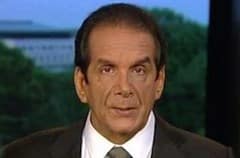It is not often that we agree with neocon scribe Charles Krauthamer, especially in RPI’s “Neocon Watch” column. In fact we are ashamed. But we have to admit he has a point. The Obama Administration’s approach to diplomacy and international affairs is rapidly devolving into infantile territory, with selfies, hashtags, and Tweets where once adults dared to tread.
It is said the people get the government they deserve, and perhaps hashtags are the most appropriate way to explain complicated geopolitical matters to the masses who prefer news pre-digested by Rachel Maddow or Bill O’Reilly. Mencken (that meanie) once wrote, “Nobody ever went broke underestimating the intelligence of the American public.”
Krauthamer’s point, made in the Washington Post today, is that a mass Tweet by individuals is the modern equivalent of a mass petition. It is a way for individuals to petition those with power on issues where their voices may be drowned out or easily ignored individually.
However, he correctly points out, it is different when you are a country. Writes Krauthamer:
When a superpower, with multiple means at its disposal, reverts to rhetorical emptiness and hashtag activism, it has betrayed both its impotence and indifference.
That is why the Obama Administration’s current hashtag and Tweet campaign over the kidnapping of Nigerian schoolgirls by the Boko Haram terrorist group seems so silly. And that is why it has opened the door to so many poignant critics, who correctly point out the hypocrisy in a US administration obsessed with a supposed kidnapping of young girls while its commander in chief routinely uses drones to send other innocent girls to a far worse fate (warning: graphic!).
Krauthamer rightly decries the “fatuousness” of the State Department’s hashtag diplomacy, but here’s the catch: his protest is not made out of any non-interventionist impulse. For Krauthamer the neocon psychiatrist, bombs are always preferable to Tweets.
What Krauthamer misses, predictably, is that it was his beloved interventionism in the first place that established Boko Haram — and the various “jihadist” forces in Libya, Mali, and throughout Africa — in their position to act with impunity in the region.
Boko Haram, in other words, is blowback for US interventionist foreign policy. The US (and its allies) created the problem and now war-planners take great interest in plotting the solution. It is a massive conflict of interest.
As Brendan O’Neill wrote in Spiked Online this week:
…nothing boosted Boko Haram’s fortunes so much as the West’s assault on Libya in 2011. It was that vain bombing war, that Western-led dismantling of a regime that cohered Libya and its border regions for 40-plus years, which created new spaces in West Africa in which Boko Haram could train, get hold of weaponry and, in the words of one Nigerian observer, become more ‘audacious’ than ever. The Western politicians and hacks now expressing heartbreak over Boko Haram’s barbarism are the same ones whose urge to intervene in Libya provided Boko Haram with new forums in which to hone that barbarism.
Libya was an attack that, as to be expected, Krauthamer supported whole-heartedly.
The chaos created by the US and NATO attack on Libya, writes O’Neill, opened up space in Mali where Nigerian Islamists trained and acquired the weapons that made their way to Boko Haram and were likely used in the kidnapping.
The author cites a 2012 AFP report that Boko Haram members were training with al-Qaeda in the Islamic Maghreb in Mali.
So it was the interventionism relentlessly preached by the likes of Krauthamer — and carried out by Michelle “hashtag” Obama’s husband — that created the conditions making it possible for the kidnap of the schoolgirls in Nigeria.
That is called “accessories to the crime.” ICC anyone?


